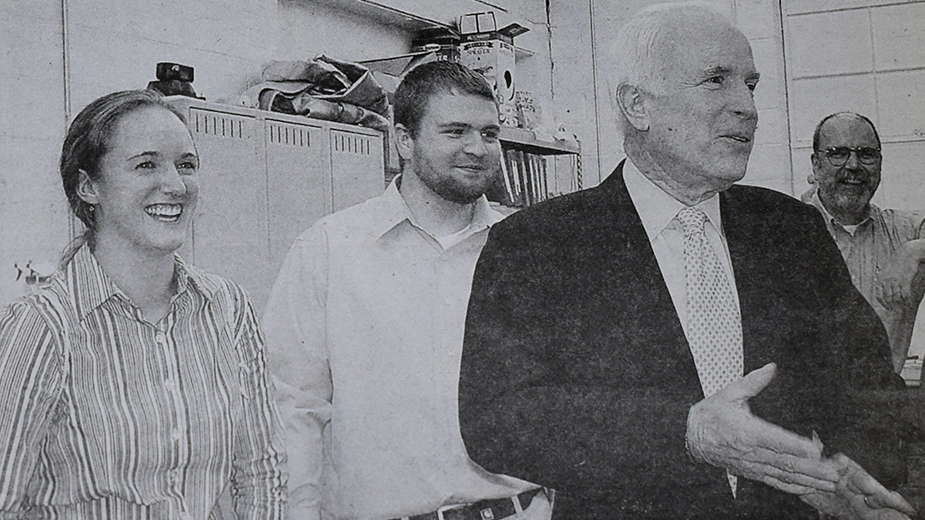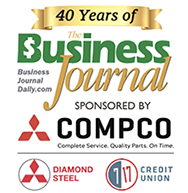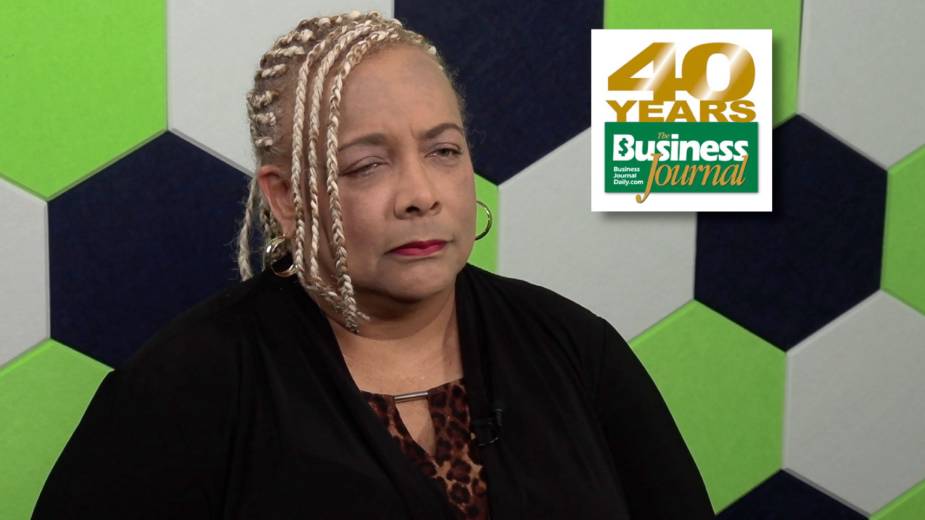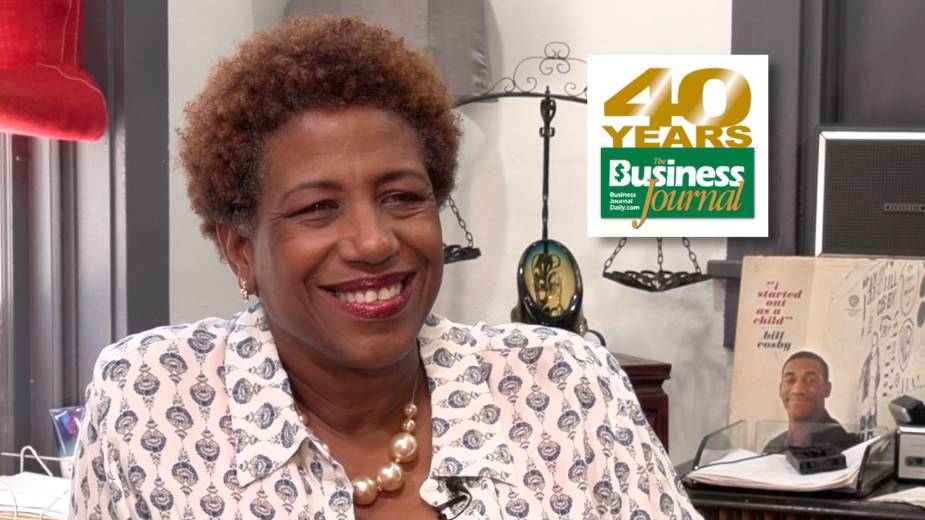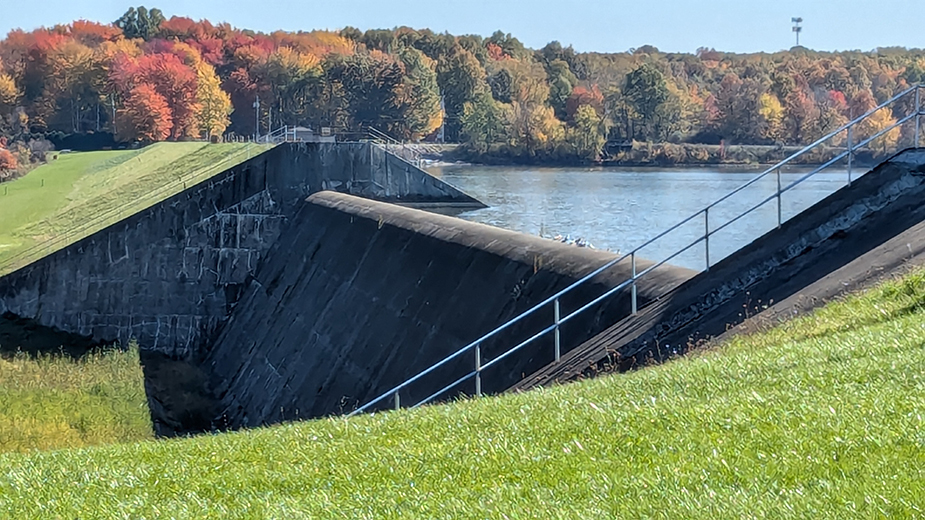Business Journal Classic: Presidential Candidates Parade to the Valley
YOUNGSTOWN, Ohio – In the wake of Black Monday, idled steel mills in the Mahoning Valley became the backdrop for presidential candidates seeking the support of disheartened workers and their families.
The parade began in 1980, when Ronald Reagan met local and national reporters in front of the shuttered Campbell Works.
In 1984, Democrats Walter Mondale and Geraldine Ferraro would echo a similar Valley-left-behind message at other local venues. The talking points were not exclusive to either party.
It wasn’t until the June 1987 edition of the Youngstown/Warren Business Journal that we made our first foray into covering presidential politics. The occasion was the visit of Rev. Jesse Jackson, the civil rights leader and all-but-declared Democratic presidential candidate who came to Youngstown for an event honoring activist and TV show host Ron Daniels.
“No place has been more devastated by plant closings, corporate irresponsibility and greed than this valley,” Jackson said.
In 1988, the Mahoning Valley’s congressman, U.S. Rep. James A. Traficant Jr., pumped up by national notice of his one-minute tirades about the left-behind Mahoning Valley, mounted his own bid for the Democratic nomination. It was short-lived – he dropped out and was re-elected to Congress.
In May 1990, we reported how a visit to Youngstown by Vice President Dan Quayle ignited a political firestorm. George Voinovich, the former Republican mayor of Cleveland then running for Ohio governor, announced plans to bring Quayle to a meeting with Mahoning Valley mayors.
Many local Democratic mayors – who had said weeks earlier they wanted to meet with both parties’ gubernatorial candidates to complain that Valley votes were taken for granted – skipped the meeting with the Republicans at Youngstown City Hall, which was hosted by Mayor Patrick J. Ungaro.
“There’s more political reform in the Soviet Union than there is in the Mahoning Valley,” Ungaro joked.
In 1992, Bill Clinton, the Democratic nominee for president, would make the first of several visits to the Mahoning Valley. In August of that year, Clinton and his running mate, Al Gore, and their spouses, stopped at Southern Park Mall in Boardman to address a large crowd gathered there.
President Clinton returned July 4, 1996, to join in the twin celebrations of Youngstown’s 200th anniversary and Mahoning County’s 150th. An editorial in our MidJuly 1996 edition reflected on Clinton’s implied promise in 1992 to site a Pentagon payroll center here. (It never happened.)
At the time, there was talk that federal funding would be coming to create an air cargo facility at Youngstown-Warren Regional Airport as well as money for brownfield cleanup and the designation of an economic empowerment zone.
The Business Journal was skeptical.
“It’s time to stop expecting pie-in-the-sky to feed our economic future,” we editorialized. “We didn’t get where we are today by 200 years of begging, and begging won’t get us where we want to go tomorrow. Instead, we need to embark on a high-visibility, aggressive campaign to promote the many benefits this region has to offer.”
In October 1996, Clinton’s transportation secretary would come to the Valley bearing a check for $11.5 million to fund airport improvements needed to develop an air cargo hub (which still hasn’t happened). That was followed a few weeks later by Vice President Gore’s Oct. 25 appearance in Austintown, a week before Clinton and Gore defeated U.S. Sen. Bob Dole, a Kansas Republican.
In August 2000, GOP presidential nominee George W. Bush, the son of the man Clinton ousted in 1992, visited the B&O Station in Youngstown. We published a photo that showed Bush – who would win the White House – embracing Youngstown Mayor George McKelvey, a Democrat.
McKelvey said he was ready to meet Gore, the Democratic standard bearer. The mayor explained he was seeking greater federal attention on the plight of his city, its high unemployment rate and crumbling social and physical infrastructure.
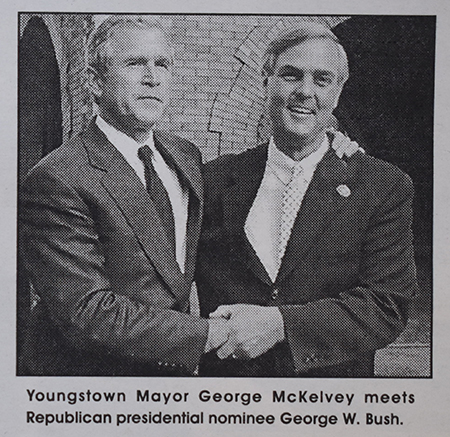
National congressional politics came into local play in 2001 with Traficant’s vote to elect Republican Dennis Hastert as House speaker, a quid pro quo that led to Traficant getting $25 million to build a convocation center in Youngstown. House Democrats punished Traficant by taking away his committee assignments.
In 2004, Bush’s path to re-election brought him through Youngstown a couple of times – and McKelvey was invited to the White House. On May 25, 2004, McKelvey was among 200 community leaders who attended “A Conversation on Health Care and Health Centers.” The mayor said he would be seated next to Bush at a White House dinner the following day.
“If he’s open to business discussion versus just social, I’d like to talk about the air base and its importance to the community,” as well as creating incentives for businesses to stay in the United States and expand, McKelvey said.
In August 2004, McKelvey crossed party lines to endorse Bush, citing his “strong leadership” in the war on terror. “Furthermore, I cannot agree with those who criticize a tax policy which allows the American people to keep more of their own money,” he said.
McKelvey joined Bush at Youngstown-Warren Regional Airport in late October 2004, where he served as master of ceremonies for the president’s rally there. Among the attendees was Sharon businessman James E. Winner Jr., whose Winner Aviation owned the hangar that housed the rally. Winner said he was impressed with what Bush had to say and he was “the leader we need” for the next four years.
U.S. Sen. John Kerry, the Democratic standard bearer in 2004, did not let the traditionally Democratic Mahoning Valley go uncontested. Kerry made several stops here, among them a staged hunting trip at Molnar Farms in Springfield Township with then-U.S. Rep. Ted Strickland.
“With our economy dragging and costs going through the roof, George W. Bush has done nothing to create jobs,” Kerry told the crowd gathered Oct. 3, 2002, at Austintown Fitch High School for a town hall.
After Bush’s victory, speculation was rampant that McKelvey would leave City Hall for a post in his administration or that of Gov. Bob Taft, according to a story first reported by The Valley Voice, the newspaper published by striking employees of The Vindicator.
As Bush was nearing the end of his second term, he named McKelvey – who was out of office by then – as a U.S. observer to the International Fund for Ireland.
Buoyed by Democratic successes nationally and in Ohio in 2006 – Strickland had been elected governor and Sherrod Brown had unseated U.S. Sen. Mike DeWine – presidential candidates began making their way to the Mahoning Valley well ahead of the 2008 election.
On June 20, 2007, U.S. Sen. Barack Obama, whose stirring speech at the 2004 Democratic National Convention placed him in the national spotlight, headlined a fundraiser in the Boardman home of businessman Herb Washington.
Speaking with reporters after the event, Obama talked about how high health-care costs had burdened employers like bankrupt Delphi Corp. Business is “a lot more desperate” than when his chief rival for the Democratic nomination, U.S. Sen. Hillary Clinton, attempted health care reform when she was first lady in the 1990s, he asserted.
“Then it was much more of an individual problem. Now businesses see they’re in an uncompetitive situation,” Obama said. “They’re burdened by high health-care costs when companies from other countries aren’t.”
About a month later, Kerry’s 2004 running mate, John Edwards, who was making his own White House run, stopped at the Youngstown Business Incubator and Beatitude House as part of his “Road to One America” tour. Edwards touted YBI as “a model for things that can be done nationally.”
On Oct. 19, 2007, Democratic House Speaker Nancy Pelosi would pay her own visit to YBI, where she similarly praised it as “a model for the nation. ” She lauded the “phenomenal” leadership shown by U.S. Rep. Tim Ryan. “In every way you would hope your representative would represent you. Tim Ryan has done so,” she said.
Until January 2008, McKelvey’s successor, Jay Williams, was unsure whether he would endorse a candidate in the Democratic primary. But he threw his full support behind Obama and would campaign on his behalf.
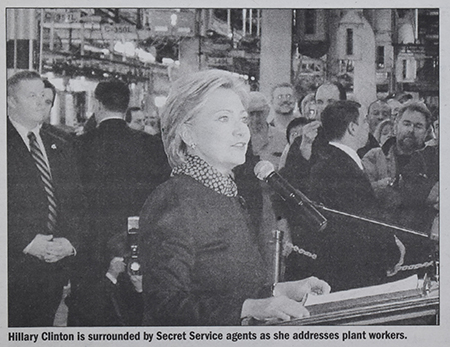
“You can stand on the sidelines, or you can take a risk for something you believe in,” Williams said.
By February 2008, the Democratic contest was down to Obama and Clinton, with Ohio’s delegates up for grabs. The two senators were in intense competition in the weeks leading up to the March 4 primary.
Hillary Clinton, appearing at the General Motors Lordstown Complex accompanied by allies including Strickland, displayed a pair of boxing gloves worn by middleweight champion Kelly Pavlik given to her by local Democratic icon Harry Meshel. Taking a jab at her primary rival’s lauded oratorical skills, she remarked that while her opponent gives speeches, she offers solutions.
“It’s one thing to get people excited. I want to empower you,” she said.
Obama would enlist his own star power to boost his prospects, bringing in Caroline Kennedy and U.S. Sen. Edward Kennedy, who spoke at Youngstown State University on Feb. 16, 2008. Kennedy recalled when his brother, John F. Kennedy, came to downtown Youngstown in the final days of the 1960 presidential campaign.
“We’ve always been received warmly here, and I feel like we’re among family,” he said.
Kennedy promised that Obama would “stop the shipment of good American jobs out of the country.”
Other surrogates appearing on behalf of the two candidates during the primary included Michelle Obama and Chelsea Clinton.
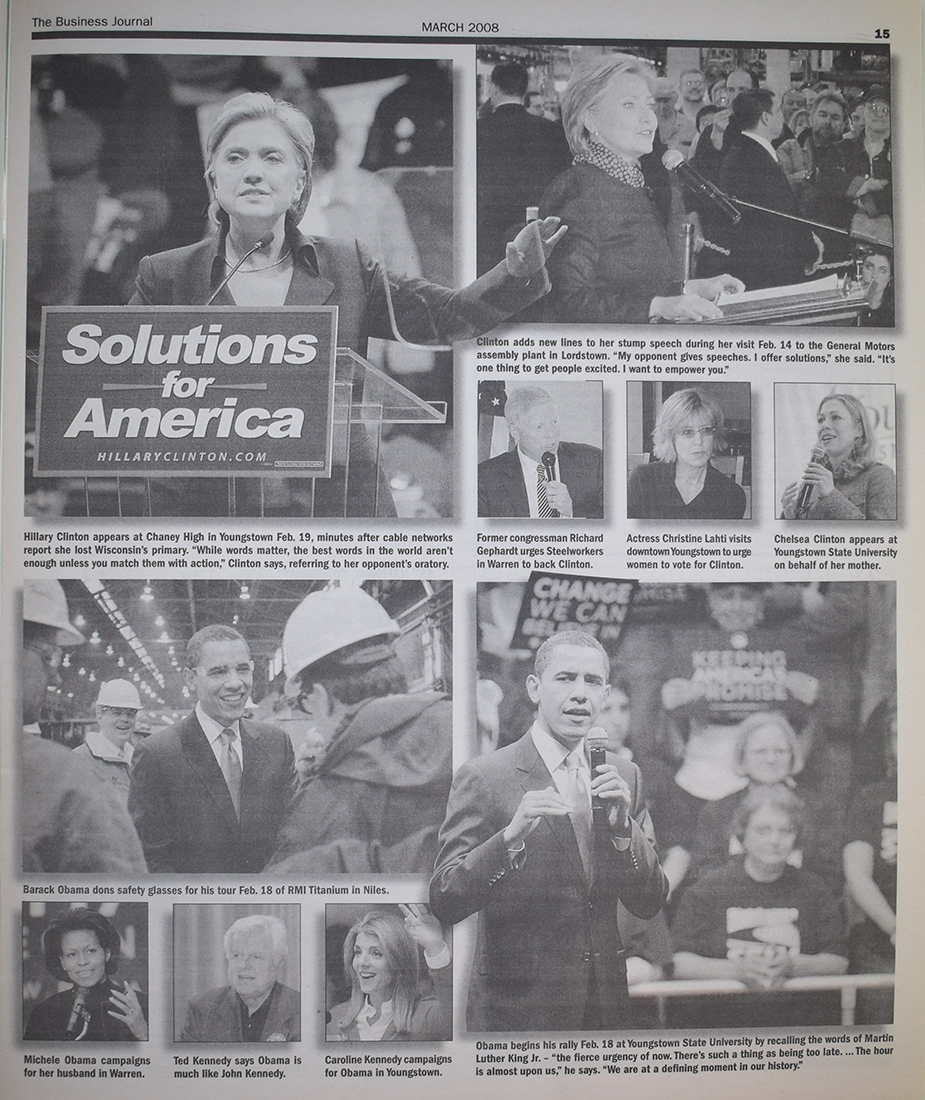
Obama spoke Feb. 18 at RMI Titanium in Niles before delivering an address at YSU. The former community organizer observed that what happened on the south side of Chicago when steel mills closed there also happened in Youngstown.
“It taught me that ordinary people can do extraordinary things when they’re given the chance,” he said.
Clinton spoke the following day at Chaney High School and would return to the area for a rally in Austintown just days before the Ohio primary, which she won decisively.
That left Ryan – who represented the 17th district, which Clinton also won – pondering how he would cast his vote as one of Ohio’s so-called superdelegates, as neither Clinton nor Obama had a clear path yet to winning the nomination.
“There’s a lot to be considered here. I’m just going to sit back and see what’s in the best interests of the 17th district,” Ryan said.
After U.S. Sen. John McCain clinched the 2008 GOP nomination for president, he visited two local manufacturers in April – Fab Art and Fireline – and conducted a town hall at YSU. During the local visit, the Republican said protectionism has never worked for the economy and cited high tariffs in the 1920s as a factor that brought on the Great Depression.
“Protectionism and isolationism are not the answer,” McCain said.
McCain and Obama would make additional stops locally in the lead-up to the 2008 general election.
Obama focused on energy issues at an Aug. 5 event in Austintown, as he prepared to formally accept his party’s nomination at the Democratic National Convention. Among those who would attend his acceptance speech in Denver was Youngstown Mayor Williams.
Though the Valley wasn’t among the scheduled stops on the bus tour following the convention, Obama and his running mate, U.S. Sen. Joe Biden, joined by their spouses, stayed at an Austintown hotel overnight and ate breakfast at the Yankee Kitchen restaurant in Boardman Aug. 30.
Restaurant owner Phil Raptis said meeting the Obamas and Bidens was a “once in a lifetime” experience. Obama is “real down-to-earth,” he added.
McCain would return to the Mahoning Valley for a Sept. 16 rally at the regional airport, his third visit by then in 2008. He was joined by his running mate, Alaska Gov. Sarah Palin, a pick that MSNBC pundit Joe Scarborough described as a “Youngstown play” for white cultural conservatives.
Aiming to capitalize on concerns about the growing financial crisis, McCain said he and Palin would end “the reckless conduct, corruption and unbridled greed that have caused a crisis on Wall Street” and accused his Democratic opponent of “political opportunism.” McCain returned to YSU Oct. 31, where he was interviewed live on Good Morning America.
Among the major surrogates who visited the area in the lead-up to the general election was former New York Mayor Rudolph Giuliani, who spoke to volunteers and supporters Oct. 13 at GOP headquarters in both Mahoning and Trumbull counties to mobilize Republican support.
Soon after the polls closed on Election Night 2008, Obama was declared the winner, the first person of color in U.S. history to be elected to its highest office.
Williams, Obama’s early endorser and co-chairman of the campaign’s Mahoning Valley operation, celebrated the Obama-Biden ticket’s victory during an election night gathering at B&O Station.
“It was emotionally overwhelming, it was mentally overwhelming,” Williams said. “I had tears.”
Pictured at top: Kendra Shook and Bill Purnell, interns from Youngstown State University, met U.S. Sen. John McCain on April 22, 2008, as he toured Fireline Inc. in Youngstown. That month McCain also visited Fab Art and conducted a town hall at YSU.
Copyright 2024 The Business Journal, Youngstown, Ohio.
